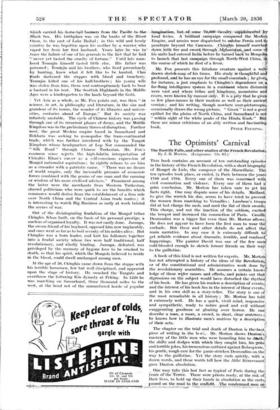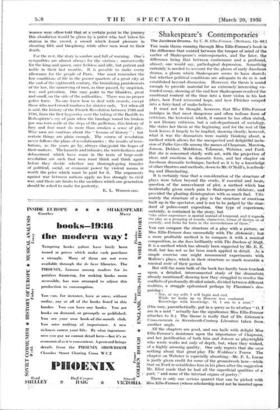The Bastille Falls, and other studies of the French Revolution;
The Optimists' Carnival
By J. B. Morton. - (Longruans:" 12s. 6d.) THIS book contains an account of ten outstanding episode4 in the history of the French Revolution, with a short biographi of Rouget de Lisle, the compoXer of the Marseillaise. ten episodes took place, or ended, in Paris between the year 1789 and 1794. Every one of them ' was concerned wick civil commotion and violence. Every one of them had grim conclusion. Mr. Morton has taken care to get hiS. facts right. One may dispute some of his details. Maillard to give the wretch his due, seems to have tried to preverii the women from marching to Versailles ; Lambesc's trook did at last charge the mob, and used the flat of their swordii This charge, and not the inaction of the soldiers, excite0.- the temper Ind' increased the comMotion Of Paris. Camilt Desmoulins was a bigger liar even than Mr. Morton- Ile does not appear to have been the first man to wear t cockade. But these and other details do not affect t main narrative. In any case it is extremely difficult toZ: get reliable evidenee about dramatic, terrible, and eon happenings. The painter David was one of the few me cold-blooded enough to sketch former friends on their wa to the guillotine.
A book of this kind is not written for experts. - Mr. Mortot has not attempted a history of the ideas of the Revolutioh
or of the constitutional and administrative work done ti the revolutionary assemblies. He assumes a certain know ledge of these wider causes and. effeetscaudrpOints out that digressions on the subject would have disturbed the rhythr4 of his book. He has given his readers a description of evenbi,i. and the interest of his book lies.in-the interest of these evenb0 and in his own skill as a story-teller. The story is one of the most remarkable in all history ; Mr. Morton has told, it extremely well. He has a quick, vivid mind, responsive';, and sympathetic, ready to notice good and evil without( exaggerating goodness or gloating over horror. He caul' describe a man, a room, a crowd, in short, clear sentences 4: he knows how to illustrate men's motives by a descriptionl;
of their acts. • f
The chapter on the trial and death of Danton is thethesti piece of writing in -the lx o'c. • Mr. Morton shows Dante:an4. mastery of the little men who were hounding him to delittli,r4 the shifts and dodges- with which they caught him, his and terrible jokes, his tremendous outburst against Robespierre, his gentle, rough care for the panic-stricken Desmoulins on the. way to the guillotine. Yet the story ends quietly, with 'a-i• dozen words, and these words tell how the Abbe Keravenantl gave Danton absolution.
-4 One may take this last fact as typical of Paris during th
• • • a - years ofthe Terror. There were priests ready, at the risk of their lives, to hold up their hands in absolution as the carts passed on the road to the scaffotd.- -The condemned- 'pen OW women were oftetrtold that at a -certainpoint in the. JO-Insleythis absolution would be given by a priest who had lakeliIiis
station in the crowd, a crowd which found pleasure in shouting filth and blasphemy while other men went to their death.
For the rest, the story is sombre and full of warning. One's sympathies are almost always for the victims ; unreservedly for the king and queen, once feckless-and idle, but patient and noble in their last months. It is possible to make every allowance for the people of Paris. One must remember the low conditions of life in the poorer quarters of a great city at the end of the eighteenth. century, the brutalising punishments of the law, the unnerving of men, as time passed, by suspicion, war, and privation. One may point to the blunders, great and small, on the side of the authorities. There was no proper police force. No one knew how to deal with crowds, except those who used crowd madness for sinister ends. Yet when all is said, the history of the French RevolUtiOn between 1789 and 1791, from the first hypocrisy over the taking of the Bastille to Robespierre's cry of pain when the bandage round his broken • jaw was torn aside at the steps of the guillotine, this history of fury and fear must do more than awaken a sense of pity. Wise men are cautious about the " lessons of history " ; but certain things are plain enough. The course of revolution never follows the plans of revolutionaries ; the results of revo- lutions, as the years go by, always disappoint the hopes of their makers. The hazards and infamies, the wretchedness and debasement which have come in the train of large-scale revolution are such that men must think and think again before they decide whether any thorough-going transfer of political, social, or economic power by violent -means is' worth the price which must be paid for it. The arguments against war between nations apply no less strongly to civil war, and there are limits to the sacrifices which one generation should be asked to make for posterity.
E. L. WOODWARD.



































































 Previous page
Previous page